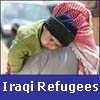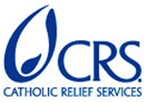 |
Iraqi
Refugees: Living in Limbo “We had to flee Iraq because of the violence,” he began. “One day, while I was at work, my wife was confronted by militia members with a warning, ‘get out or you will be killed.’” She fled first with their children. They entered Syria as tourists -living on the streets for four days. Eventually, he joined them and they headed for Lebanon. They have been living in a poor neighborhood in southern Beirut for a while now. It is winter and very cold in their sparse concrete apartment. He cannot find work. When and if he does, his visibility in Lebanese society puts him at risk for arrest. There are no “refugees” in Lebanon-only illegal immigrants. Lebanon, like Syria, has not signed the UN Refugee Convention; therefore, these countries are not required by international law to protect Iraqis who are fleeing for their lives. His wife is occasionally employed as a domestic worker in a Lebanese household. But the pay can be as low as $3.25 a day. The rent is $150.00 a month. Their school age children are not in school. There simply isn’t enough busfare money to get them there. The husband’s eyes are vaults of sorrow. He has no destination-no future in sight. He cannot return to Iraq and he cannot remain in Lebanon. Like millions of other Iraqi refugees, this family has escaped death in their war-torn land only to find themselves living in limbo. As a snapshot of the ever expanding mural of this humanitarian and moral crisis, this family’s story highlights those realities with which Iraqi’s have to cope everyday in exile: it is unsafe to return home- they cannot find work in neighboring lands- they are running out of resources- they cannot attain legal status in host countries- traumatized by war and with little access to healthcare services they are coping with chronic illnesses- many Iraqi children are not attending school-many are working in dangerous situations to support their families, -women, who are able to find day work, are under-paid, some are resorting to prostitution to buy food for their children -in some families the desperation is beginning to flow over in the form of violence. With more than 4 million people displaced, (one in five), Iraqis are the third largest and fastest growing refugee population in the world. Host countries such as Lebanon and Syria are experiencing the enormous strain that the refugees have placed on their infrastructures. For example, rent prices in Syria, since the Iraqi’s arrived, have increased 5-6 times. Food and oil prices have skyrocketed as well. The UN Refugee Commission, (UNHCR) in both Lebanon and Syria, describe the painstakingly slow pace of processing refugees for resettlement. There are a number of screening interviews, background checks, medical exams and then the process of matching the criteria of host countries to the profile of the refugee. Although the U.S. promised to receive 7,000 Iraqi refugees by the end of fiscal year ‘07, only 1608 were resettled in the U.S. The ’08 quota of 12,000 is off to a slow start, with only 1324 757 refugees being resettled in the first four months (Oct-Jan) of the ‘08 fiscal year. Humanitarian organizations, church groups and women religious in Syria and Lebanon are working with limited resources to provide services and protection for the Iraqi refugees. Some of the women’s congregations are beginning projects that include temporary shelters for women and children, psycho-social support, legal services, medical care, medicines and food. In our conversations with the women religious of Syria and Lebanon, they shared appreciation for our presence, urged our advocacy and asked for our prayers, solidarity and collaboration in their work. Within the coming months, there will be concrete projects identified in Lebanon and Syria, where U.S. faith based groups can collaborate with women religious in projects that support Iraqi refugees. The Humanitarian Crisis of Iraqi refugees unleashed by the ‘03 Gulf war places grave moral responsibilities upon the United States. As the country whose many missteps in Iraq contributed to the culture of violence from which Iraqis are fleeing and to the loss of their human rights, the U.S. has an irrefutable moral obligation to the Iraqi refugees. Identified in the Catholic Social Encyclical, Pacem in Terris. The work of the U.S. with respect to restoring Iraqis human rights includes ensuring their rights to: food, shelter, clothing, medical care, social services, as well as their rights to education, the practice of religion, family life, employment and the right to free movement and migration. The U.S. has an obligation to provide the resources required to protect, assist and resettle those displaced by the violence in Iraq. At the very least, this means providing all the funding required so that human rights can be restored and freedom from violence is attainable. Life in limbo is an intolerable solution for Iraqis caught in the crossfire of war and the failures of U.S. policy. Expediting visas and extending quotas for Iraqi refugees who seek refuge in the U.S. is not only a matter of moral urgency - it is a matter of life and death. Advocacy Action: UNHCR FUNDING: Encourage the US government to generously fund the UNHCR appeal of $261 million for FY08 operations relating to Iraqi refugees in the region. The U.S. has quickly offered to provide 1/3 of the requested UNHCR funding whenever there has been a request. However, the overall funding at times has gone unmet. The U.S. should increase its contribution to this needed fund. BILATERAL FUNDING FOR HOSTCOUNTRIES: Support bilateral funding to the governments of Lebanon, Jordan and Egypt to ease the burden placed on host governments with large refugee populations. Seek mechanisms for and support to the refugees, NGOs and UNHCR operating within Syria. RESETTLEMENT IN THE UNITED STATES: Encourage
the US State Department to meet at least its target goal of resettling
12,000 refugees this year and consider the possibility of allocating
more resources and personnel to expedite the processing of refugees
especially in Department of Homeland Security that does the security
interviews with Iraqi refugees.
|
The Family of
OUR Family in Iraq Iraqis are the third largest and fastest growing refugee population in the world. |



